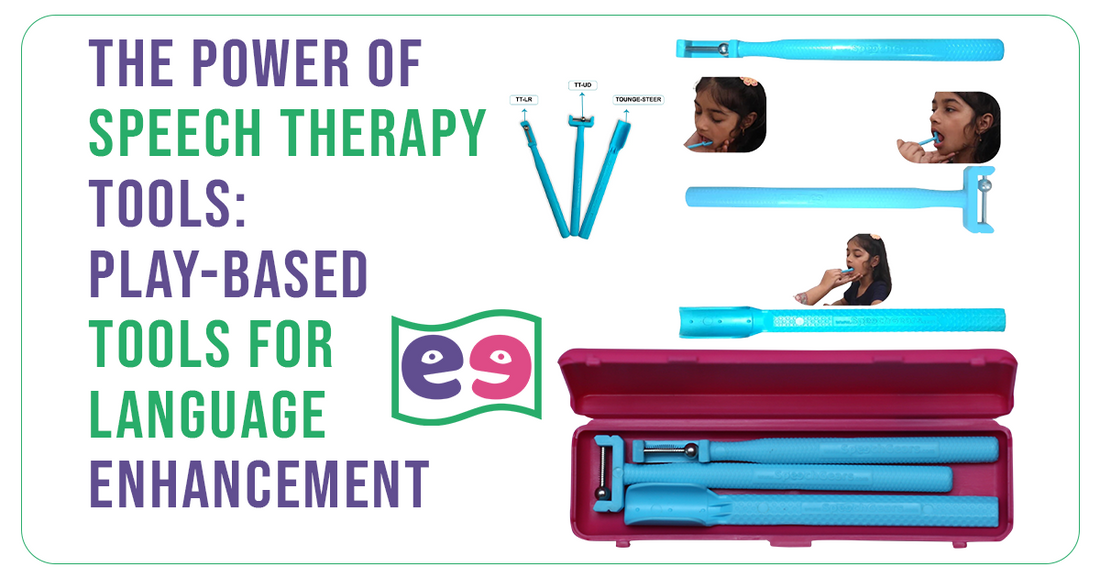Introduction
Effective communication is essential for personal, professional, and academic growth. For individuals facing challenges in ASD, speech therapy serves as a transformative involvement for them. SpeechGears has played a significant part in making speech therapy playful and effective in improving language skills.
This blog will explore the power of play-based speech therapy tools in promoting language development.
The Evolution of Tools for Speech Therapy
Speech and language therapy involves structured exercises and drills and focuses on improving communication skills. However, a shift towards play-based speech and language therapy makes it an enjoyable and interactive process, especially for children. This makes it an ideal medium for learning and language enhancement.
Powerful Play-Based Speech Therapy Tools
- Flashcards and Learning Board
Changing up regular board games by adding language elements can work wonders in speech therapy. SpeechGears designs perfect Ultrakids flashcards for kids that aid their visual memory but can also help them learn things through visual perception. Instead of a regular board game, give your child our Day Learning Board game, specifically designed to teach them the concept of days and months and develop the building blocks of a child's education.
- Stacking Blocks
Stacking blocks by SpeechGears are used in unstructured play and improve the ideas and imagination of kids. These blocks are made of premium quality beech wood and are crack-resistant, whose crackling sounds are generally enjoyed by children.
- V-Pen and Sucking Tube
V-Pen is a vibrating oral motor tool that helps in speech therapy, feeding therapy, and other applications. These food-grade material-made speech tools provide oral stimulation, thus decreasing oral aversions and normalizing oral sensitivities. A sucking tube is another comprehensive device designed for a progressive resistance program. By various stages of sucking, children can strengthen their oral muscles, which can further help them with swallowing and speech.
- Tongue Depressor for Speech and Language
The tongue depressor is one of the speech therapy tools used for tongue exercises, lip strengthening activities, and tongue placement training. The smooth edges of these tongue depressors can help quickly move a child's tongue. These are crackproof and child-safe devices can also be used for various motor activities.
- Speech Kit
This specialized kit by SpeechGears consists of a tongue lateralization tool that helps the lateral movement of the tongue tip and speech development of children or adults.
The Impact of Play-Based Speech Therapy Tools
- Enhanced Engagement and Motivation
Play-based speech tools make therapy sessions enjoyable, especially for children. Such playful sessions naturally capture their interest and develop a positive attitude towards language development.
- Contextual Learning
Play-based tools develop a context for language learning that imitates real-life situations. This approach helps individuals apply learned language skills in therapy to everyday activities, fostering practical and functional communication.
- Enhanced Creativity and Imagination
Speech therapy tools, such as flashcards, boost creativity and imagination, encouraging the use of language. Making up stories and scenarios improves vocabulary and helps individuals express their thoughts more clearly and consistently.
- Personalized Learning
Different play-based tools allow therapists to customize activities addressing the needs and interests of individuals. This personalized way ensures that therapy is fitting, attractive, and matches the person's goals.
- Social Interaction and Communication Skills
These engaging play-based tools involve social interaction that helps develop individuals' communication skills. This, in turn, allows them to listen, respond, and communicate promptly.
- End Note
By integrating play-based speech therapy tools, we can observe a significant shift in the landscape of language development. By using the power of play, therapists can unlock endless possibilities to develop and refine the communication skills of individuals. This can be done through interactive games, storytelling, or artistic expressions and offers an effective avenue for language development. As we continue to explore the innovative approaches in speech therapy, we expect it to be a powerful catalyst for language development.


